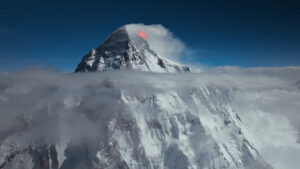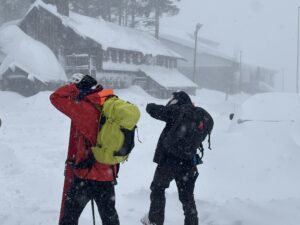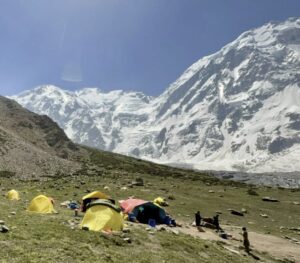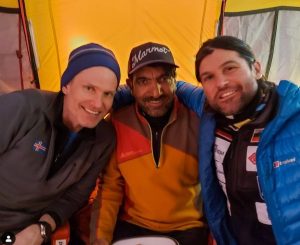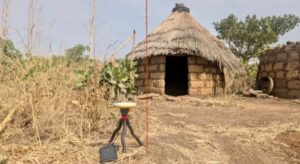Pythom/Explorersweb checked in with Col Manzoor about Pakistan climbing bans, rules and safety.
(First published Friday, July 29 2016 at 03:39AM) Rumors had it at the start of the Karakoram season that some teams had been turned back a the border and banned from climbing in Pakistan. We checked in with the Alpine Club for answers. Here goes:
Pythom: Is it correct that some expeditions were banned from climbing in Pakistan this season, and which teams are they?
Manzoor Hussain: First of all Alpine Club of Pakistan (ACP) wishes to state that it is a mountaineering and sports climbing federation and is neither a Government department nor its representative/spokesperson.
Mountaineering and climbing, which is now a provincial matter is being handled by Gilgit-Baltistan Council Secretariat, a federal government department located in Islamabad.
The process of issuing climbing permits involves clearance of the intended climbers by various concerned federal Government ministries. However, it may please be noted that as per international norm each country reserves the right of allowing entry to foreign citizens into their territory notwithstanding the fact that the visitor have been issued either visitor visa or climbing permit.
As per our knowledge/record no expedition was banned by Government of Pakistan.
The Australian-New Zealand climber Ms. Christine Patricia Burke, along with her Nepali Sherpa partner were part of 7 member Nanga Parbat Expedition led by Italian mountaineer Mr Carlo Orlando beginning 5th June 2016. At the same time she had also applied for climbing permit for Broad Peak.
On arrival at Islamabad Airport Ms Burke was refused entry into Pakistan. As she had visited Pakistan earlier for climbing, ACP, therefore assume that the refusal may be related with violation of any terms/conditions of her past climbing permits which also include provision of correct background information.
The accompanying Nepali Sherpas who, after Ms Burke’s entry refusal, chose to return back to Nepal. At the same time her application for climbing Broad Peak was withdrawn by the concerned tour operator on client’s advice.
Pythom: The information we got states that the reason for the ban was the teams brought too many Sherpa with them to help with the climbing logistics. Is this correct?
Manzoor Hussain: This information is incorrect. No expedition was refused climbing permission for the reason that they brought many Sherpas with them.
Out of the total 24 expeditions which have been issued climbing permit till date during summer 2016, eleven expeditions have brought Nepali Sherpas as their climbing members. This includes a ten member strong Nepali Sherpa expedition on K-2.
In total 35 Nepali Sherpas are presently attempting Pakistan’s mountains. Considering these facts one can conclude the correct picture about climbing activities of Nepali Sherpas in Pakistan.
Pythom: Does the Alpine Club of Pakistan plan to limit/prohibit foreign guides/outfitters in the future?
Manzoor Hussain: Mountaineering communities of Nepal and Pakistan enjoy close, friendly and historical relationship. Many Nepali Sherpas have climbed/perished on K-2 and other high peaks of Karakoram, and on Nanga Parbat, before and after Pakistan’s independence, and therefore enjoy close relationship with Pakistan’s mountains.
In view of these historical and friendly ties ACP has never recommended prohibiting Nepali Sherpas from climbing in Pakistan.
However, to protect own mountain tourism industry ACP is definitely against any foreign outfitters/logistic support providers operating in Pakistan. In order to protect and promote own high altitude porters and safeguard their job opportunities ACP has pursued all stake holders to fix a suitable ratio of Nepal Sherpas vis a vis local High Altitude Porters (HAPs) on the expeditions so as not to effect jobs of the local HAPs while facilitating the foreign mountaineers who wish to bring their Nepali Sherpas on their climb.
The suggested ratio is one Nepali Sherpas against 2.25 local HAPs on the concerned expedition. However it is not yet being implemented by the tour operators and the mountaineer clients.
Pythom: What rules should mountaineers expect?
Manzoor Hussain: The foreign mountaineers should be allowed to bring the Nepali Sherpas with them in accordance with the earlier mentioned ratio.
No foreign tour operator/facilitator/logistic support provider/trekking guide/kitchen staff should be allowed to operate in Pakistan to ensure job opportunities for the local HAPs and other mountain tourism related staff/personnel. However, as per present practice they can collaborate with the local tour operators.
Pythom: A few years ago terrorists executed mountaineers on Nanga Parbat. What measures, if any, have been taken to increase safety of visiting mountaineers?
Manzoor Hussain: Since the terrorists attack on Diamer Base Camp of Nanga Parbat on 22 June 2013 very strict security measures have been put in place on Karakoram Highway leading to mountain areas of Gilgit-Baltistan both by the federal and provincial governments.
On Nanga Parbat local Police check posts have been established on all routes leading to the Diamer, Rakhikot and Rupal base camps and unauthorized person are stopped from travelling further, especially during the climbing season.
As far as Karakoram is concerned, Army camps exist on Baltoro and other climbing areas since early 80’s and no untoward incident has ever been reported. It is pleasure for the ACP to state that mountain areas of Gilgit-Baltistan and Chitral (Hindukush) are very safe destinations for the international mountaineers, trekkers and other visitors.
Manzoor Hussain is President of the Alpine Club of Pakistan.
Ed note: Chris Jensen Burke declined an offer to comment.
“}

